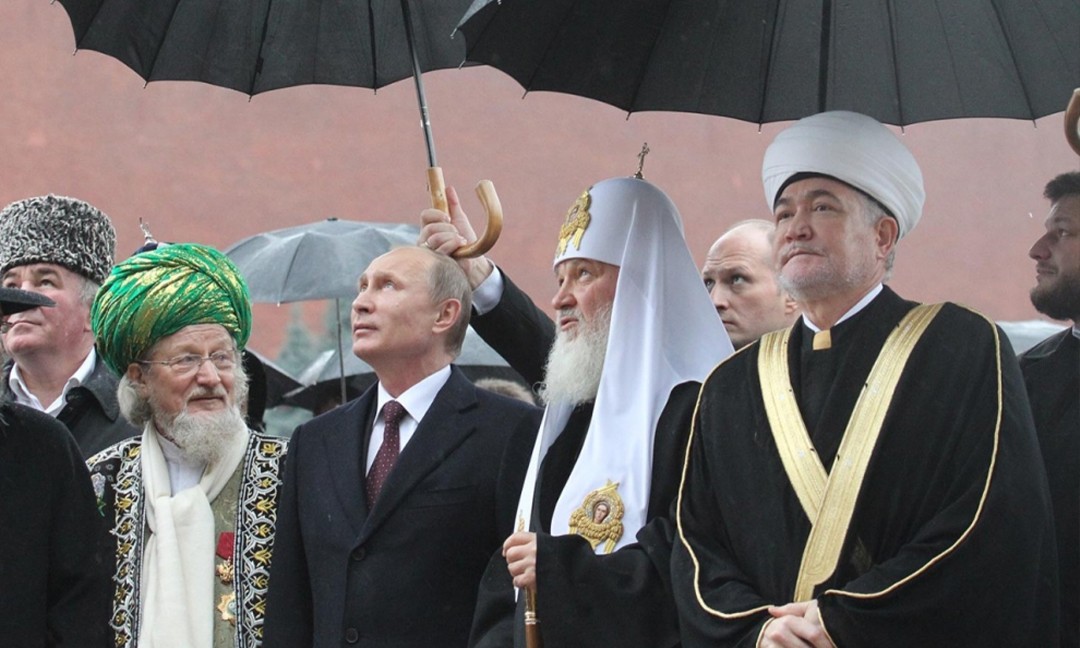The fake news that appears in Türkiye from time to time and becomes fodder for conspiracy theories, such as “Putin converted to Islam”, should be read together with the headline “Eid prayers were performed by 250 thousand people in mosques in Moscow”.
We can also place in this context Putin’s famous statement from 2010, which he clarified nearly a decade later by saying, “I meant it geographically”:
We are Eastern Christians: we are Orthodox. Some scholars argue that many principles of Eastern Christianity are closer to Islam. We are more distant from Catholics.
In 2011, he said the same thing as Gaddafi: “NATO intervention in Libya resembles a crusade.” The framework of this move outside of Russia can be drawn as a wink to its former Soviet allies in the Islamic geography, like the “Muslim Putin” rhetoric in Türkiye.
However, the real big picture for Russia is that the current Muslim population in Russia will cease to be a “minority” in the coming decades with the new large migrations from its “near abroad” and will have the potential to become one of the “co-founding elements” of the “New Russia”.
In the June 10 editorial of Nezavisimaya Gazeta, Russia’s “Islam reflex” is analyzed under the question: “Why did Orthodox and Muslim representatives get into a dispute?”
In the editorial of Nezavisimaya Gazeta dated June 10, the “Islamic reflex” of the Russian state is analyzed with the question, “Why did the representatives of Orthodoxy and Islam enter into an argument?”
“Muslim army” and culture of dialogue – why did representatives of Orthodoxy and Islam enter into a debate?
The case of Skhiigumen Gavriil (Vinogradov-Lakerbaya) demonstrates how the style of relations between the Russian Orthodox Church and Muslim communities in Russia has changed over the past decade. Gavriil was the head of the Sochi branch of the Valaam Monastery, but was removed from his post after a sermon he gave at the end of May. Interestingly, his resignation coincided with the reaction from Islamic representatives to his words, although the religious authorities at Valaam claim this was merely a coincidence.
What about interfaith harmony? Few people now remember that 10 years ago one influential representative of the Moscow Patriarchate proposed “to unite the caliphate, Holy Russia and the Soviet Union,” while another said that Europe was more afraid of losing faith in God than Islam. Russian Orthodox missionaries once cited Muslims as examples of religious devotion and urged Christians to emulate them. Today, that same devotion is perceived as the greatest threat to Russian identity.
This same view was expressed shortly before Eid al-Adha in Gavriil’s sermon. According to the monk from Sochi, a “Muslim army” was “ready to slaughter Muscovites on the command of a mullah.” He also claimed that Islam was a “false” religion. This was a secondary issue to his main message, which was full of conspiracy theories, but the Sochi monk’s words deeply disturbed Muslims.
On behalf of the Muslim community, Gavriil was harshly criticized by Apti Alautdinov, Deputy Chief of the General Staff of the Russian Armed Forces. His remarks, however, also disturbed the Orthodox activist group “Sorok Sorok.” They viewed the general’s offensive comments not just as a personal insult toward Gavriil, but as an attack on a sacred institution. The group demanded that General Alautdinov be punished and that the monk be reinstated.
Later, Alautdinov apologized to Gavriil, saying he was wrong only because he had offended an elder. But such statements did not satisfy the activists. They demanded that the general apologize to the entire “Orthodox community.”
Among the official voices from the Moscow Patriarchate who commented on the situation was Archbishop Savva (Tutunov), responsible for missionary work in the Russian Orthodox Church. The archbishop noted that the monk often “spoke nonsense,” but he stated that he agreed with the preacher about the “rightness” and “wrongness” of religions. Tutunov criticized the “syncretic presentation of relations between Islam and Christianity” that was “unique” to Alautdinov and claimed that the general was trying to open up discussion about the “primary historical and cultural significance of Orthodoxy for our homeland.”
Against this background, another news story emerged. A video of a soldier, presumably a Muslim, throwing a grenade into a building next to a church in the city of Suzdal in the Kursk region, which was liberated from the Ukrainian army, was circulated on social media.
The signs of a unique Eurasian crisis, once observable in the attitude of representatives of the Russian Orthodox Church a few years ago, are now evident. It can be said that the long-standing policy followed by the state, based on the unchanging solidarity stance of the Russian Interreligious Council, is also showing signs of erosion. The concept of shared spiritual bonds among traditional divine religions has begun to crack under the pressure of debates increasingly resembling quarrels.
These interfaith “reckonings” reflect the evolving style of public discourse emerging in various sectors of society. The ability to listen to opposing views has evidently been lost. Intolerance and rigidity are on the rise. The deterioration of the culture of debate increasingly affects interfaith relations, which are a sensitive area for the state and society.


